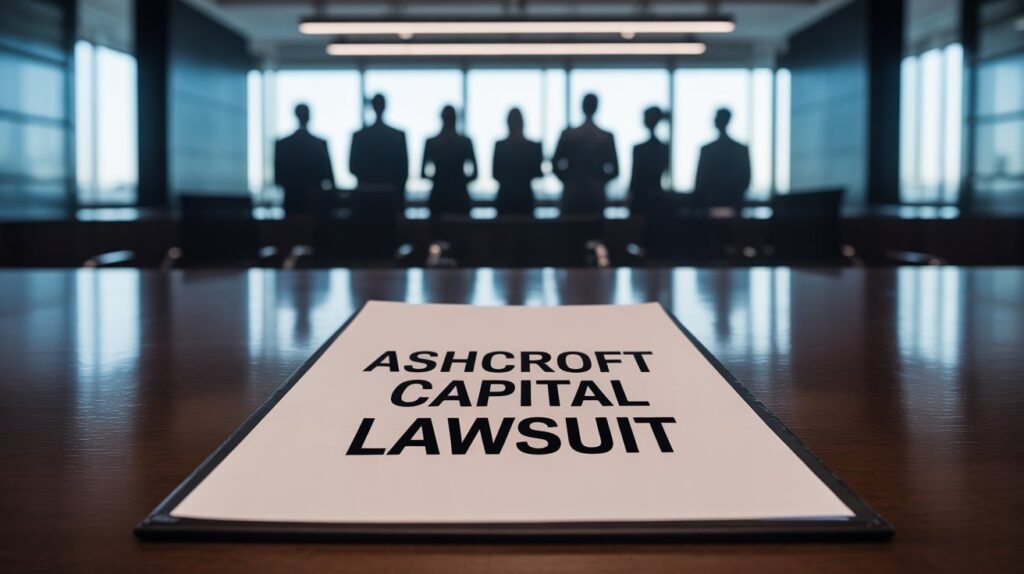When you hear terms like lawsuit and real estate firm in the same sentence, it can raise questions, especially if you’re an investor. Over the last few months, there has been growing interest in the topic of the ashcroft capital lawsuit. People want to know what it’s about, who’s involved, and whether it affects their money or real estate portfolio.
If you’re looking for an honest, clear, and easy-to-follow guide, you’re in the right place. This article will explain the background around Ashcroft Capital, what led to the lawsuit, why it matters, and what it could mean for you. Whether you’re an investor, industry follower, or someone new to private real estate firms, this article will walk you through it all step by step.
Let’s talk facts, understand context, and most importantly, learn how to protect yourself in similar situations.
What Is Ashcroft Capital?
Ashcroft Capital is a private real estate investment firm based in the United States. The company is known for helping investors make passive income through large apartment communities, also called multifamily properties. They buy underperforming apartment buildings, improve them, and earn a return by raising rents and increasing the property’s value.
Led by co-founder Joe Fairless, Ashcroft Capital has promoted itself as a reliable choice for people wanting to invest in real estate without owning property directly. Over the years, many investors have trusted the company thanks to its educational events, solid branding, and strong online presence.
In short, Ashcroft Capital helps people grow their income through real estate funds and partnerships—no landlord duties needed.
What Is the Ashcroft Capital Lawsuit About?
The ashcroft capital lawsuit involves legal concerns related to how the company managed and communicated some of its real estate investments. Although details are still being confirmed, the situation has raised questions about transparency, risk management, and investor protection.
As of now, the case reportedly involves allegations related to:
- Misleading performance projections
- Failure to disclose key financial risks
- Potential losses tied to underperforming apartment deals
- Questionable use of investor money in specific funds
Calling it fraud at this stage may be too early. Courts still need to review facts and both sides must be heard.
Why Did the Lawsuit Gain Attention?

People started paying more attention after several media outlets and financial forums began discussing the lawsuit. It was especially surprising because Ashcroft Capital has long been seen as a trusted real estate group, especially in the world of passive investing.
Joe Fairless, one of its founders, hosts a well-known real estate podcast. Many beginner and experienced investors follow his advice and have placed money in Ashcroft’s deals. When someone that well-known faces legal challenges, it makes headlines.
Who Filed the Ashcroft Capital Lawsuit?
Most reports suggest that investors filed the lawsuit after claiming they suffered unexpected losses tied to poor property performance or financial mismanagement. The exact names of the people suing are not always public, depending on which court is handling the case.
What’s known is that investors say they weren’t fully informed about the true risks. Some say they were promised steady returns but instead, properties underperformed due to rising interest rates or poor timing.
Whether or not Ashcroft broke any laws is still being evaluated.
What Properties Are Involved?
Ashcroft Capital has real estate holdings across the country, especially in states like Texas, Georgia, and Florida. Some reports suggest the lawsuit involves properties that struggled financially after 2020.
This could include apartment complexes that suffered from:
- High expenses or renovation costs
- Low occupancy rates
- Delayed refinances due to higher interest rates
- Missed rent income and cash flow issues
When properties lose money and investors feel uninformed, lawsuits like the ashcroft capital lawsuit can follow.
How Does the Real Estate Syndication Model Work?
To understand the lawsuit, it helps to know how real estate syndication works.
Ashcroft Capital pools money from multiple investors to buy large properties. Ashcroft acts as the sponsor, managing the deal. The investors provide the capital but usually remain hands-off.
Investors earn money through:
- Regular rental income (distributions)
- Profit sharing when the property is sold
But if the property doesn’t perform as expected, investors can lose income or even their original investment.
How Has Ashcroft Capital Responded?
Ashcroft Capital has publicly stated it stands by its investment process. The company says real estate, like all investments, comes with risk. They’ve denied hiding information or misleading anyone.
Still, some investors feel expectations weren’t managed properly or feel projections were too optimistic. The investigation is still ongoing, so the outcome isn’t clear yet.
Whatever happens next, this situation reminds all real estate firms to stay transparent and honest.
What Role Did the Market Play?
The real estate market has changed a lot since the pandemic. Property values shifted, loan rates increased, and rental forecasts became harder to predict.
Some of Ashcroft Capital’s troubles may be linked to these market shifts. But even if that’s true, sponsors are expected to adapt and communicate with their investors. If they don’t, it opens the door to disputes—and lawsuits.
Can Investors Protect Themselves From Similar Situations?
Yes. The ashcroft capital lawsuit is a reminder that investors need to do their homework.
Here are steps to protect yourself:
- Read the private placement memorandum carefully
- Ask about risks and what happens in a downturn
- Check the sponsor’s track record
- Understand what assumptions are being made
- Don’t just rely on past success—demand updated figures
- Join online forums to learn from others’ experiences
Syndication can be safe when there’s clear communication and honest forecasting.
What Might Happen Next?
The ashcroft capital lawsuit may continue for many months. Possible outcomes include:
- The case gets dismissed
- A private settlement is reached
- The court sides with either the investors or Ashcroft Capital
- New regulatory guidance for investor disclosures in syndications
Until then, many investors are holding off on new investments until more details are released.
Impact on the Real Estate Investment Community
The ashcroft capital lawsuit has arrived at a time when people are already nervous about the economy, rent growth, and interest rates. So this case has hit a nerve.
Some people are now more cautious. Others are doubling down on due diligence before putting any money into future deals.
In the long run, this lawsuit may push sponsors to be more transparent. That could be a positive shift across the industry.
FAQs
1. What is the Ashcroft Capital lawsuit about?
The lawsuit focuses on claims that Ashcroft failed to properly communicate major risks and used investor money poorly.
2. Did Ashcroft Capital break the law?
That hasn’t been decided yet. The case is ongoing and will go through the court process.
3. How does this affect current Ashcroft investors?
Some investors may face delays or unexpected changes in returns. Not all deals were impacted.
4. Can I still invest in Ashcroft Capital?
Yes, but new investors should research deeply and remain cautious until the lawsuit is resolved.
5. Is this type of real estate investing risky?
All investing carries risk. Syndication can offer great returns, but only when managed carefully and transparently.
6. Will this lawsuit change how syndications work?
It might. If more firms get sued, we may see stronger rules on what has to be disclosed to investors.
Final Thoughts
The ashcroft capital lawsuit isn’t just about one company. It’s about learning how real estate deals work and what questions investors should be asking before they sign any paperwork.
Lawsuits like this shine a light on how important transparency, communication, and conservative planning really are.
Whether you’re a seasoned real estate pro or a first-time investor, let this case be a reminder. Not every opportunity is what it seems on the surface. Be smart, ask questions, and never invest blindly.
Because when your money’s on the line, you deserve to know the whole story.



